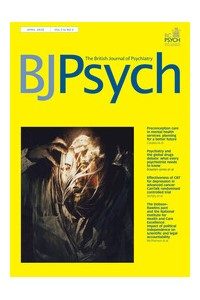Background perinatal depression and anxiety are associated with unfavourable child outcomes.
Aims to assess among women with antenatal depression or anxiety the effectiveness of prenatally initiated cognitive–behavioural therapy (CBT) on mother and child compared with care as usual (CAU). Trial registration: Netherlands Trial Register number NTR2242.
Method
Pregnant women (n = 282) who screened positive for symptoms of depression and/or anxiety were randomised to either CBT (n = 140) or CAU (n = 142). The primary outcome was child behavioural and emotional problems at age 18 months, assessed using the Child Behavior Checklist (CBCL). Secondary outcomes were maternal symptoms during and up to 18 months after pregnancy, neonatal outcomes, mother–infant bonding and child cognitive and motor development at age 18 months.
Results
In total, 94 (67%) women in the CBT group and 98 (69%) in the CAU group completed the study. The mean CBCL Total Problems score was non-significantly higher in the CBT group than in the CAU group (mean difference: 1.38 (95% CI −1.82 to 4.57); t = 0.85, P = 0.399). No effects on secondary outcomes were observed except for depression and anxiety, which were higher in the CBT group than in the CAU group at mid-pregnancy. A post hoc analysis of the 98 women with anxiety disorders showed lower infant gestational age at delivery in the CBT than in the CAU group.
Conclusions
Prenatally initiated CBT did not improve maternal symptoms or child outcomes among non-help-seeking women with antenatal depression or anxiety. Our findings are not in line with present recommendations for universal screening and treatment for antenatal depression or anxiety, and future work may include the relevance of baseline help-seeking.


